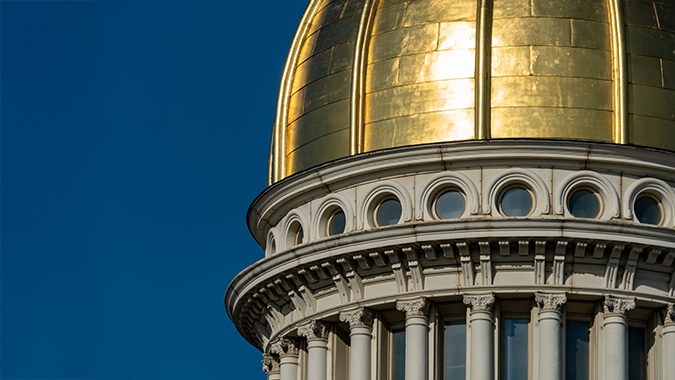Government needs to put its money where its mandates are by both providing consumers with financial incentives to buy electric vehicles and deploying sufficient public charging infrastructure to get EV drivers where they need to go without worrying their cars will lose power.
That was the message delivered on Tuesday at NJBIA’s 3rd annual Energy Policy Conference by Jim Appleton, president of the New Jersey Coalition of Automotive Retailers (NJCAR) and Matt Forman, director of Government and Regulatory Affairs at North American Subaru, headquartered in Camden.
Their panel discussion, moderated by Jeanette Hoffman of Marathon Public Affairs, explored the ramifications of the state’s proposed rule requiring EVs to account for an increasing share of new car sales each year until they reach 100% in 2035 when sales of new gas-powered cars would be banned in New Jersey.
The Department of Environmental Protection is accepting public comment on the rule until Oct. 20.
Banning the sale of cars with gasoline engines without addressing obstacles to EV ownership – the higher prices of EVs and dearth of public charging stations – will harm New Jersey car dealers without making the air any cleaner because people will simply hold on to their gas cars longer, Appleton said.
“We have serious concerns about what the mandate will do to the marketplace,” he said.
Right now, many consumers who are “EV intenders” walk into a dealer showroom but end up buying a conventional hybrid or a plug-in hybrid instead of a true zero-emission EV because EVs cost more, and consumers have “range anxiety” – the fear of losing power before the driver can find a charging station.
“First of all pure battery electric vehicles are sometimes $10,000 or $13,000 more than a comparably equipped internal combustion engine vehicle and then they get into the discussion about ‘range anxiety’ ... and if they don’t live in a house with a garage where they can charge their vehicle overnight, most consumers are walking out the door because they don’t trust the infrastructure that’s there,” he said.
Forman said Subaru is fully committed to the transformation of the automotive industry with the switch to zero-emission vehicles, but the cost of certain materials needed to make EVs is currently the obstacle to making EVs more affordable for consumers.
“EVs, just by the nature of the technology right now, are very expensive; they are $10,000 more than an internal combustion engine,” Forman said. “The biggest factor is the raw materials that go into the batteries and for us that that is the critical minerals. Unfortunately, China dominates the market when it comes to processing critical minerals so for us to build the EVS to meet these demanding rules we need more of these critical minerals to bring the cost down for these batteries.”
The federal government has tried to reduce the cost to consumers with tax credits for the purchase of EVs, but right now those credits are too difficult to obtain, Forman said.
“There are all these restrictions, you know, at some point if you have the smallest amount of critical minerals or any components from China, you are excluded from the program,” Forman said, noting that underscores the need to get away from dependence on China for critical minerals.
As for the problem of range anxiety, New Jersey now ranks last in the nation in terms of the ratio of public EV chargers to the number of electric vehicles on its roads, Forman said. “For this to succeed, we need to see an investment in charging (stations).”
To view an ACCII story on the NJCAR website, click here.




